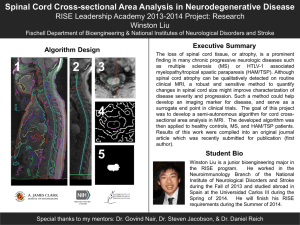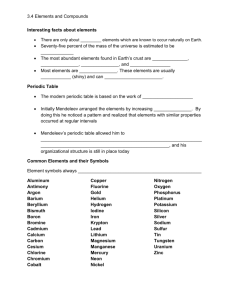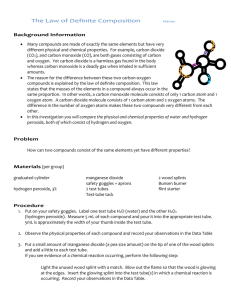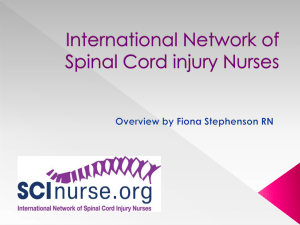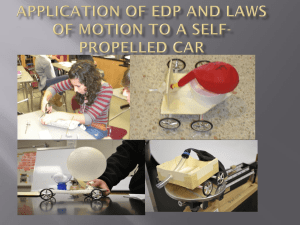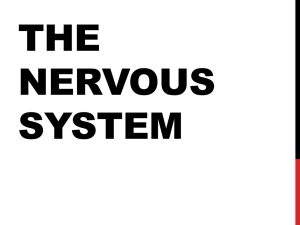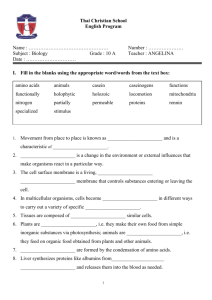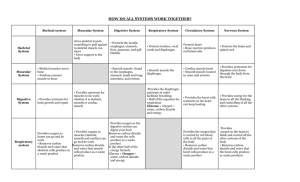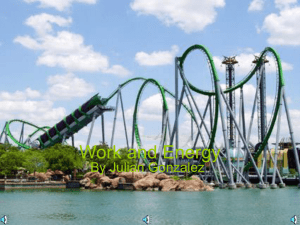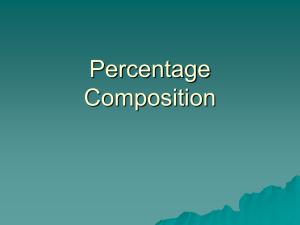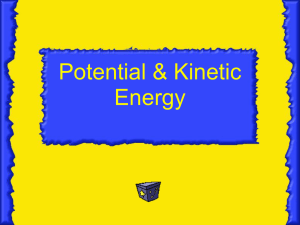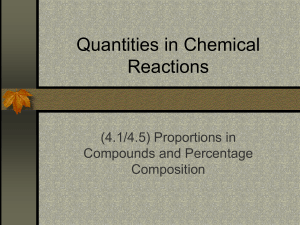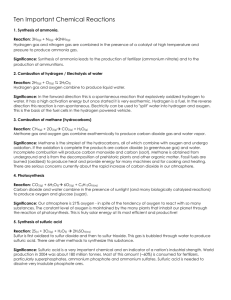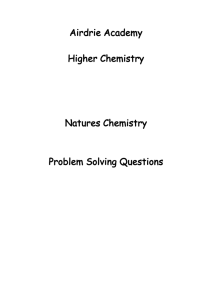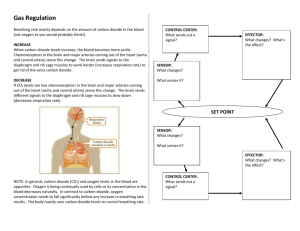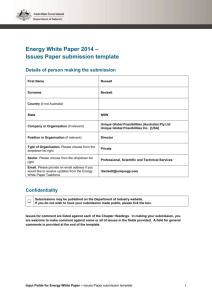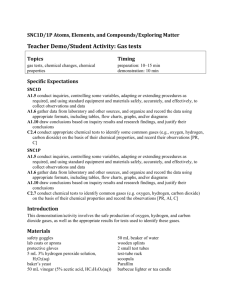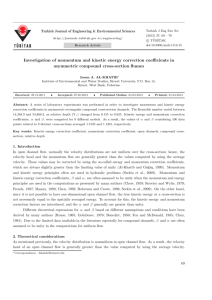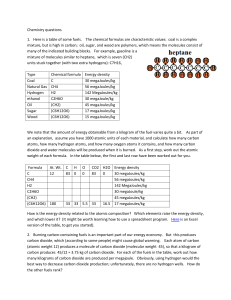Sample Paper CAT C
advertisement
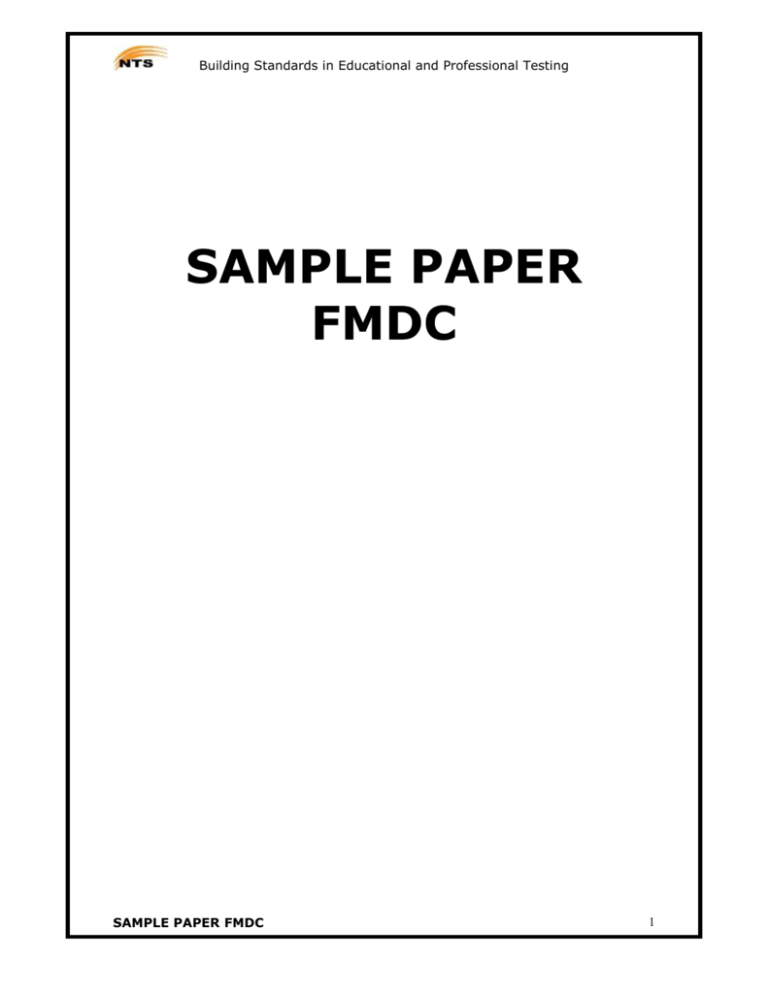
Building Standards in Educational and Professional Testing SAMPLE PAPER FMDC SAMPLE PAPER FMDC 1 Building Standards in Educational and Professional Testing ENGLISH Complete the sentences by choosing the most appropriate option, from the given lettered choices (A to D) below each. 1. Sensory cells _______ impulses by producing electrical signals. A. B. C. D. responding to respond respond to respond 2. The first engine ______ heat to drive a machine was the steam engine. A. B. C. D. made use of to make use of of using of making use Choose the lettered word or phrase that is most nearly opposite in meaning to the word in capital letters. 3. GENEROUS: A. B. C. D. kind liberal harsh relaxing Identify the word or phrase that needs to be changed for the sentence to be correct: 4. Ali finds it difficult to put his idea into words. No error . A B C D E Choose the word most similar in meaning to the capitalized ones. 5. TREAD: A. B. C. D. dejection walk expectation hope SAMPLE PAPER FMDC 2 Building Standards in Educational and Professional Testing Read the passage to answer the question 6-7 It is important that we should develop an attitude of objective and clear thinking in the study of science. It will open and enlarge our minds which are the very soul of science. Experiments and research work have brought about great advancement in science. Therefore, we must realize that science is a creative activity. 6. Objective and clear thinking make the study of science A. B. C. D. easier difficult fruitful enjoyable 7. Experiments and research work are A. B. C. D. different related unrelated opposite SAMPLE PAPER FMDC 3 Building Standards in Educational and Professional Testing CHEMISTRY 8. What volume of oxygen is required for the complete combustion of a mixture of 5 cm 3 of CH 4 and 5 cm 3 of C 2 H 4 ? 3 A. 5 cm B. 10 cm C. 15 cm D. 20 cm E. 25 cm 3 3 3 3 9. A gaseous organic compound, X, was burnt in an excess of oxygen. A 3 0.112 dm sample of X, measured at s.t.p., produced 0.88 g of carbon dioxide. How many carbon atoms are there in one molecule of X? A. B. C. D. E. 1 2 3 4 8 10.Which value would be required to estimate the lattice energy for the hypothetical ionic compound MgH? A. B. C. D. the the the the electron affinity of hydrogen first ionization energy of hydrogen magnesium-hydrogen bond energy standard enthalpy change of formation of MgH SAMPLE PAPER FMDC 2 4 Building Standards in Educational and Professional Testing PHYSICS 11.A racing car accelerates uniformly through three gears, changes with the following average speed: ms 1 for 2.0 s 1 40 ms for 2.0 s 1 60 ms for 6.0 s 20 What is the overall average speed of the car? ms 1 A. 12 B. 13.3 C. 40 ms 1 D. 48 ms 1 E. 37 ms 1 ms 1 12.Which of the following statements is correct for a particle moving in a horizontal circle with constant angular velocity? A. B. C. D. E. The linear momentum is constant but the kinetic energy varies. The kinetic energy is constant but the linear momentum varies. Both kinetic energy and linear momentum are constant. Both speed and linear velocity are constant. Neither the linear momentum nor the kinetic energy is constant. 13.A generator produces 100 kW of power at a potential difference of 10 kV. The power is transmitted through cables of total resistance 5 . How much power is dissipated in the cables? A. B. C. D. E. 50 W 250 W 500 W 1000 W 50000 W SAMPLE PAPER FMDC 5 Building Standards in Educational and Professional Testing BIOLOGY 14.How does an enzyme increase the rate of a reaction? A. B. C. D. By By By By bringing the reacting molecules into precise orientation increasing the rate of random collisions of the molecules shifting the point of equilibrium of the reaction supplying the energy required to start the reaction 15.The cell transmits impulses from the A. B. C. D. E. effector organ to the spinal cord receptor cells to the effector organ receptor cells to the spinal cord spinal cord to the effector organ spinal cord to the receptor cells 16.Which one of the following is the correct out line of the main events in photosynthesis? A. B. C. D. E. Oxygen reacts with a carbohydrate to produce water and carbon dioxide in the presence of light Light joins carbon dioxide to an acceptor compound which is then reduced by hydrogen obtained from water Light splits water and the resulting hydroxyl group combines with a compound which has incorporated carbon dioxide Light splits carbon dioxide and the resulting carbon then combines with oxygen and hydrogen obtained from water Carbon dioxide combines with an acceptor compound and this is reduced by hydrogen split from water by light SAMPLE PAPER FMDC 6 Building Standards in Educational and Professional Testing ANSWER KEYS Q #. 1 2 3 4 5 6 7 8 9 10 11 12 13 14 15 16 SAMPLE PAPER FMDC Right Choice C B C E B C B E D A D B C A D E 7
